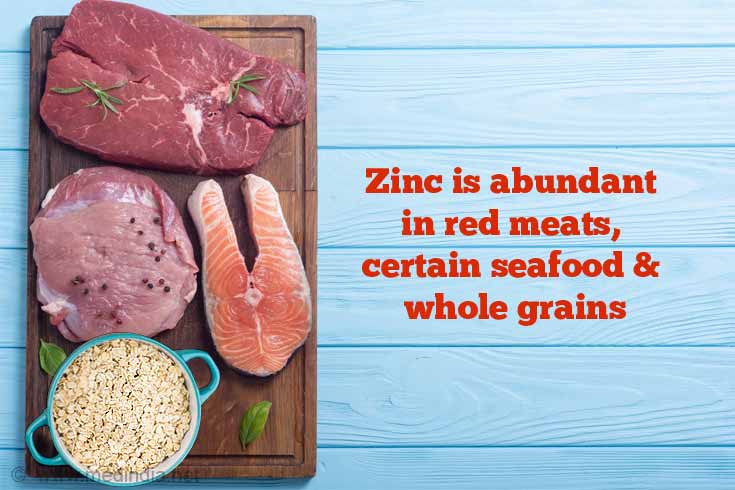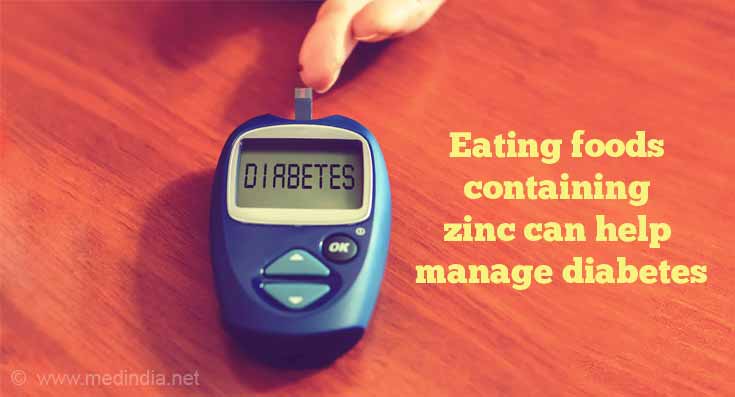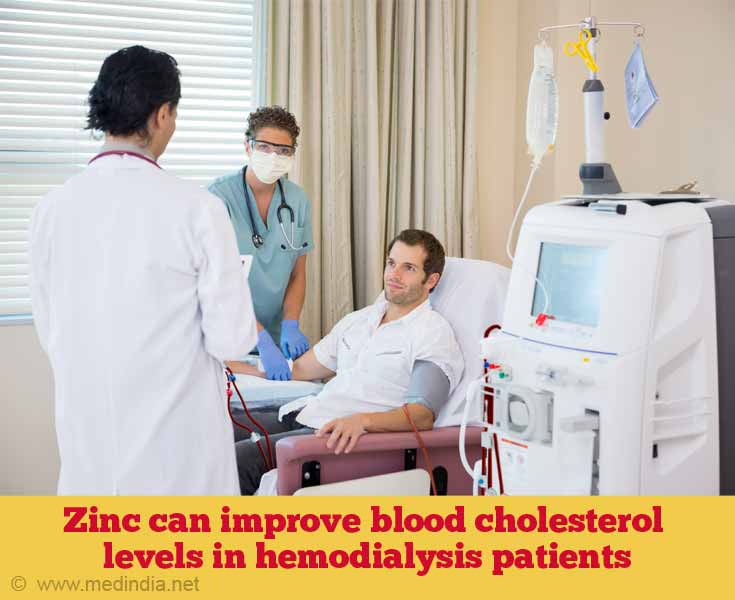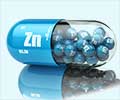- Zinc - Health Professional Fact Sheet - Office of Dietary Supplements - (http://ods.od.nih.gov/factsheets/zinc-healthprofessional)
- The accuracy of the Zinc Taste Test method. - NCBI - (http://www.ncbi.nlm.nih.gov/pubmed/22784341)
About
Zinc is a mineral that you need in small amounts in your food every day for good health. Ninety percent of the body’s zinc is found in bones and muscles.
It is found in variety of foods, so meeting the daily recommended value of zinc is not much of a problem, especially if you eat meat and its products.

Recommended Dietary Allowances (RDAs) for Zinc-
- For infants up to 6 months of age - 2mg /day
- For children of 7 months up to 3 years of age - 3mg /day
- For children 4 to 8 years of age - 5mg /day
- For children 9 to 13 years of age - 8mg /day
- Boys /men above 13 years need 11mg /day of zinc
- Girls /women above 13 years need 9mg /day of zinc
- Pregnant women require 11mg (12mg for those below 19) and nursing mothers require 12mg (13mg for those below 19) per day of zinc.
Health Benefits of Zinc
Zinc has many health benefits-
- Zinc is very important for proper functioning of the immune system.
- Zinc treatment has shown to enhance the healing process of gastric ulcers.
- Zinc may help manage diabetes.

- Zinc may help manage or reduce symptoms of sickle cell anemia.
- Zinc treatment may be effective in the management of Wilson's disease, an inherited disorder of copper metabolism where liver fails to excrete copper, resulting in chronic degenerative changes.
- Although not very well researched, zinc can be a safe and effective alternative treatment for herpes types 1 and 2.
- Topical or oral use of zinc seems to be a safe and effective treatment for acne vulgaris.
- Zinc may prove to be useful in treating ADHD in older children with higher BMI. Studies found that zinc supplements reduced hyperactive, impulsive, and impaired socialization symptoms but did not reduce attention-deficiency symptoms in other children.
- Cancer patients (head and neck cancers) who received zinc supplementation along with radiotherapy had a better clinical outcome, according to some studies.
- Shampoo containing 1 percent of zinc pyrithione helps reduce dandruff in some people.
- Zinc has been shown to improve blood cholesterol levels in hemodialysis patients. Zinc may also improve the ratio of HDL (good cholesterol) to LDL (bad cholesterol).

Zinc Deficiency
Zinc deficiency mostly occurs in vegetarians. This is because zinc is found mostly in non-vegetarian foods.
Symptoms and Signs of Zinc deficiency include-
- Growth retardation
- Impaired immune function
- Loss of appetite
- Diarrhea
- Hair loss in severe cases
- Delayed sexual maturation, impotence, and hypogonadism in males
- Eye and skin lesions
- Weight loss (sometimes)
- Delayed healing of wounds
- Mental lethargy
Many of these symptoms, however, are non-specific and are associated with number of health conditions. Unfortunately, there are no tests that can accurately assess the zinc status, and that is because zinc is distributed throughout the body. Zinc Taste Test (ZTT), a taste acuity test, is often resorted to but its validity has not yet been firmly established. Plasma and serum tests are also used to determine zinc deficiency in most countries.
Foods Considered Rich in Zinc
Zinc is abundant in red meats, certain seafood, and whole grains. ‘Because zinc is mainly located in the germ and bran portions of grains, as much as 80 percent of the total zinc is lost during milling’, according to the Standing Committee on the Scientific Evaluation of Dietary Reference Intakes.
Here are Some Foods Considered Rich in Zinc:
| Food | Milligrams (mg) per Serving | Percent DV* |
| Oysters, cooked, breaded and fried, 3 ounces | 74.0 | 493 |
| Beef chuck roast, braised, 3 ounces | 7.0 | 47 |
| Crab, Alaska king, cooked, 3 ounces | 6.5 | 43 |
| Beef patty, broiled, 3 ounces | 5.3 | 35 |
| Breakfast cereal, fortified with 25% of the DV for zinc, ¾ cup serving | 3.8 | 25 |
| Lobster, cooked, 3 ounces | 3.4 | 23 |
| Pork chop, loin, cooked, 3 ounces | 2.9 | 19 |
| Baked beans, canned, plain or vegetarian, ½ cup | 2.9 | 19 |
| Chicken, dark meat, cooked, 3 ounces | 2.4 | 16 |
| Yogurt, fruit, low fat, 8 ounces | 1.7 | 11 |
| Cashews, dry roasted, 1 ounce | 1.6 | 11 |
| Chickpeas, cooked, ½ cup | 1.3 | 9 |
| Cheese, Swiss, 1 ounce | 1.2 | 8 |
| Oatmeal, instant, plain, prepared with water, 1 packet | 1.1 | 7 |
| Milk, low-fat or non fat, 1 cup | 1.0 | 7 |
| Almonds, dry roasted, 1 ounce | 0.9 | 6 |
| Kidney beans, cooked, ½ cup | 0.9 | 6 |
| Chicken breast, roasted, skin removed, ½ breast | 0.9 | 6 |
| Cheese, cheddar or mozzarella, 1 ounce | 0.9 | 6 |
| Peas, green, frozen, cooked, ½ cup | 0.5 | 3 |
| Flounder or sole, cooked, 3 ounces | 0.3 | 2 |
*DV = Daily Value. DVs were developed by the U.S. Food and Drug Administration to help consumers compare the nutrient contents of products within the context of a total diet. The DV for zinc is 15 mg for adults and children age 4 and older. Foods providing 20% or more of the DV are considered to be high sources of a nutrient.
Zinc Rich Foods for Men
Men need to have foods that are rich in zinc to maintain the testosterone (male hormone) levels. In men, zinc protects the prostate gland from infection and from prostate inflammation. Zinc helps maintain sperm count and mobility and normal levels of serum testosterone. Studies suggest that zinc supplements taken with antibiotics may be more effective than antibiotics alone in reducing pain, urinary symptoms, quality of life, and maximum urethra closure pressure for patients with chronic prostate inflammation.
Zinc Rich Foods For Women
Zinc may help prevent osteoporosis in women, especially those who have gone through menopause. Studies have shown that low levels of zinc in women are associated with lower bone density, so, eating zinc rich foods may help decrease bone loss in postmenopausal women. Also, zinc helps boost skin health, prevents dandruff and curbs hair loss.
Zinc Rich Foods during Pregnancy
Zinc is vital for cell division and growth, so it is extremely important to consume zinc rich foods during pregnancy to ensure adequate level of zinc. Zinc also helps to avoid congenital abnormalities and pre-term delivery and plays an important role in activating height, weight and bone development in infants and children.
Zinc Rich Foods For Hair
It is important to consume zinc rich foods for healthy hair. Studies have shown that low zinc levels can result in hair loss, as well as thin, dull and graying hair. Studies have however reported conflicting results regarding efficacy of zinc in treating alopecia.
Zinc Rich Foods for Vegetarians
Since zinc mostly occurs in white and red meats and its products, zinc levels may not be adequate in vegetarians. Phytates, which are commonly found in plant foods, can reduce zinc absorption, and some researchers have suggested that this increases the zinc needs of vegetarians by up to 50 percent. However, vegetarians don’t have to feel lost. Zinc levels can be easily maintained by consuming spinach and a number of seeds like sesame seeds, pumpkin seeds and flax seeds. As an example, an ounce of pumpkin seeds, watermelon seeds, or squash seeds contains 2.9mg or 19 percent DV. Again half a cup of garbanzo beans or lentils will give you 1.3mg of zinc. So, it is important that you consume sufficient quantities of these foods.
 MEDINDIA
MEDINDIA
 Email
Email









